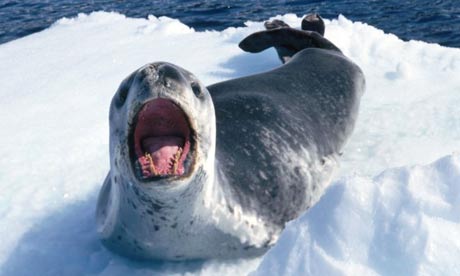� Survey challenges theories on warm and cold waters

A leopard seal, one of the marine predators scientists had to watch out for while diving off the South Orkneys in Antarctica.
------------
Seas surrounding an archipelago near the tip of the Antarctic peninsula are richer in animal life than the Galapagos islands, scientists claim today. Their findings challenge the notion that tropical regions are more rich in species than the poles.
Much less is known about the South Orkney islands than the tropical islands that helped to shape Charles Darwin's thoughts about natural selection on his Beagle voyage.
But according to a study published today by the Journal of Biogeography, the sea around them is teeming with a huge variety of life, disproving the notion that chilly polar waters have a much poorer variety of fauna.
"There has been a long-held belief that the tropics are rich and the polar regions are poor and mid-latitudes are somewhere in between," said Dr David Barnes at the British Antarctic Survey, who led the study, part of the international census of marine life. "This is the first time we've been able to actually look at the fauna of a polar archipelago - it is not actually that poor at all."
Barnes said the reason for carrying out the survey was to establish a baseline from which changes in biodiversity due to global warming could be judged: "This is in the part of the world with fastest change in terms of temperature." The Antarctic peninsula has experienced warming of 3C over the past 50 years. "If you don't know what the fauna is at any one point it is very difficult to detect either species moving in or species moving out," he added.
The survey recorded 1,224 species in 50 different biological classes. The team discovered five new species and one genus - the biological category that is higher than species - that was new to science.
More:
http://www.guardian.co.uk/environment/2008/dec/02/antarctica-animal-species-galapagos